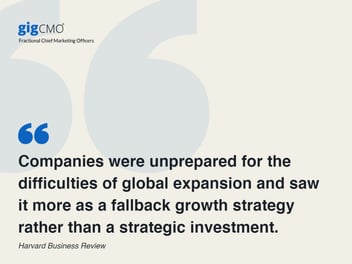
The United States has the largest economy in the world and is such an extremely lucrative market that nearly everyone dreams of entering it. With a rising population of over 328 million and a GDP of $21.44 trillion, the US offers UK companies numerous opportunities for growth and expansion.
However, despite both the US and the UK being English-speaking countries, expanding into the US market can be a challenging process due to differences that can act as invisible barriers to expansion. We’ll explore the different approaches UK companies can take to penetrate the US market and how a business can prepare for US expansion.
What's the right approach to US expansion?
When a company decides to expand its operations to the US, it can be a challenging and complex process. The approach taken to US expansion can greatly impact the success of the venture. Below are some of the key factors to consider when determining the right approach for US expansion.
Differences between running a business in the UK and the US
Running a business in the US is vastly different when compared to managing a business in the UK. The US has a different legal system, tax system, and regulatory environment.
- Access to funding: The UK and the US have different approaches to funding businesses. In the UK, there are government-backed schemes such as the Enterprise Investment Scheme (EIS), whereas, in the US, venture capital and angel investing are more prevalent.
- Economic Development Administration also play a critical role in North America.
- Taxation: The US has a federal system, which means that businesses may need to pay federal, state, and local taxes. In the UK, businesses are subject to corporation tax and value-added tax (VAT).
- Employment laws: In the UK, employees are entitled to a minimum of 28 days of paid holiday per year, while in the US, there is no legal requirement for employers to offer paid holiday.
- Culture and business practices: In the US, there is often a focus on networking and building relationships, while in the UK, there may be more emphasis on professionalism and formal communication.
- Market size and competition: The size of the market and level of competition can also vary between the UK and the US. The US has a larger population and a more diverse market, but it can also be more competitive, particularly in certain industries.
How do companies set up an entity in the US?
When expanding into the US, it’s worth considering setting up a separate entity in the US. This makes it easier to comply with legal requirements and form deals with other US companies. There are several types of entities that UK companies can choose from, with their own unique positives and negatives. These include the following:
Sole Proprietorship
This is the simplest form of business entity and is owned by a single person. The primary factor to consider in this type of entity is that the owner is not separate from the company. Because there is no separation, it means the owner is personally liable for all debts and obligations of the business. But, the owner enjoys all the profit alone.
Partnership
A partnership is a business entity owned and operated by two or more people. Similar to a sole proprietorship, the partners are personally liable for all debts and obligations of the business.
Limited Liability Company
A limited liability company (LLC) is a hybrid of a partnership and a corporation. It provides the same limited liability protection as a corporation but is taxed like a partnership.
C-Corporation
A C-corporation is a separate legal entity from its owners, and it provides the most extensive liability protection. However, it is subject to double taxation, with both the owners and corporations taxed. This is the business entity preferred by most as it offers the most protection to the owners.
S-Corporation
An S-corporation is a hybrid of a partnership and a C-corporation. It provides limited liability protection like a C-corporation but is taxed like a partnership.
How to prepare for your US expansion
Before expanding into the US market, UK companies need to prepare carefully. This involves asking several key questions:
Have you got the necessary funding to launch in the US?
Expanding into the US market requires a significant amount of resources and investment. Companies need to have enough funding to cover the costs of setting up an entity in the US, which includes hiring staff as well the invesmtent to localise products and services which may also include regulatory approvals.
Can you ensure there is enough demand for your expansion to be profitable?
Before venturing into the US market, British companies need to ensure that there’s enough demand for their product or service. Remember that what’s popular in the UK won’t necessarily be popular in the US. If there isn’t any demand for your offerings, it will take tremendous marketing effort to make it take off.
How will you tailor your offering to the US market?
The US is a diverse market with different demographics, preferences and behaviours. It is important to research and understands the target audience, including their values, interests, and buying behaviours. The value proposition should be tailored to the US market emphasising specific benefits that are important to US customers or aligning the product or service with US values.
How will you test the viability of your product or service in the US?
Companies should conduct market testing before launching their products or services in the US market. This involves testing their offering with a small group of customers to determine if it is viable.
How will you preserve your company culture?
UK companies can draw on their administrative heritage to create a compelling narrative that highlights their unique strengths and values. This could involve showcasing the company's history, traditions, and cultural roots, as well as its commitment to quality, innovation, and customer service.
By staying true to their core values and mission while also adapting to the needs and preferences of the US market, UK companies can successfully preserve their company culture and build a strong brand identity across multiple locations.
How should a UK founder incorporate their company in the US?
Incorporating a company in the US involves several steps:
Step 1: Pick the right entity type for your business.
UK companies should choose the right entity type for their business. This involves understanding the differences between the different entity types and choosing the one that best fits their needs.
C-corporations are most preferred by US companies as it provides the highest level of protection to the owners. The separation between the owners and the corporation prevents personal bankruptcy.
Step 2: Choose a state in which to register your company.
Companies need to choose a state in which to register their company. Each state has different regulations and requirements, so it's important to choose the state that best fits the company's needs.
One of the important decisions that a UK business owner needs to take when expanding into the US is choosing which state to register their company in. Delaware remains attractive for many reasons.
Step 3: File articles of incorporation.
After a state has been chosen for incorporation, UK companies must file articles of incorporation with the states. This process involves providing information about the company’s directors, shareholders, and other key personnel.
By filing this document, corporations receive certain legal rights and protection, such as having limited liability for their stockholders and the ability to sell stock.
Step 4: Obtain an employer identification number (EIN) from the Internal Revenue Service (IRS).
Companies then need to obtain an EIN from the IRS. This is a unique nine-digit number that is used to identify the company for tax purposes. Aside from the IRS, banks may require UK companies to show their EIN when they open a bank account in the US.
Step 5: Open a bank account in the US.
UK companies need to open a bank account in the US to make conducting business easier. The primary function of a US bank account is to allow the sending and receiving of payments in US dollars.
This also allows UK companies to build healthy relationships with US banks and make it easier to acquire business loans and expedite bank processes.
Step 6: Keep in good standing by filing reports.
Once a company has been registered in the US, it needs to keep in good standing by filing reports with the relevant state and federal agencies. This involves submitting annual reports and tax returns, as well as other filings as required by law.
How to Build & Deploy Marketing That Drives Results in New Markets
UK companies need to find the right approach for foreign expansion. Understanding the local market and identifying the most effective marketing channels is necessary. Analyse marketing statistics to determine whether an aggressive strategy will be successful or if a slow-and-steady approach is more suitable.
Here are some tips on how UK companies can build and deploy marketing that drives results in new markets:
Build a strong business foundation
Foundation should include a clear understanding of your company's values, mission, and goals. Additionally, it's important to identify your strengths, weaknesses, opportunities, and threats to determine how they might impact your success in new markets.
Understanding your target audience
Conduct market research to identify the demographics, psychographics, and buying behaviours of your target audience. This information will help you develop targeted messaging and campaigns that resonate with your audience.
Conducting a competitor analysis
Competitor analysis is crucial to understanding the competitive landscape in your new market. Identify your direct and indirect competitors, and analyse their strengths, weaknesses, and marketing strategies. This will help you differentiate your brand and position yourself in the market.
Product and Service Adaptation
Adapting your product or service includes understanding the cultural nuances, regulatory requirements, and consumer preferences of the market. Tailoring your product or service to meet these needs will help you gain traction in the new market.
Developing a Pricing Strategy
Conducting market research and understanding your competitors' pricing strategies can help you set the right price point for your offering. It's also essential to consider local economic factors and consumer behaviour when developing your pricing strategy.
Creating a Go-To-Market Plan
Once you have a clear understanding of your target audience, competitors, product or service, and pricing strategy, you can develop a go-to-market plan. This plan should include a detailed marketing strategy, sales strategy, and distribution strategy that aligns with your business objectives.
Execution, Resources, and Processes
Effective execution of your marketing strategy requires adequate resources and well-defined processes. This includes identifying the right team members, developing a budget, and creating a timeline for implementation. It's important to establish clear roles and responsibilities and regularly monitor progress to ensure you stay on track.
Measuring and Analysing Results
It's crucial to measure and analyse your marketing results to determine your success in the new market. Tracking key performance indicators, such as sales, customer engagement, and brand awareness. Regular analysis can help you identify areas for improvement and refine your marketing strategy over time.
Global success is not guaranteed - but it is within reach with gigCMO
Achieving global success is a challenging task that requires extensive planning, strategy, and execution. However, with the help of gigCMO, businesses can unlock a wealth of advantages that will help them achieve their goals. Some of the key advantages of working with gigCMO is developing a Playbook that will serve as a blueprint for your long-term success.
The gigCMO playbook is designed to help businesses achieve measurable results, with a focus on ROI and sustainable growth.
- Customised marketing strategies tailored to the specific needs and goals of the business can help improve the chances of success in new markets.
- A proven methodology for global expansion that has been tested and refined over many years, helping businesses to avoid common pitfalls and achieve success faster.
- A focus on data-driven decision-making, using market research and analytics to inform strategy and ensure that businesses are making the right decisions at every step of the way.
- Ongoing support and guidance throughout the global expansion process, including daily intervention and updates to ensure that businesses are staying on track and making progress towards their goals.
So why not take advantage of the resources available through gigCMO to help you achieve your business's global aspirations? The path to success may not be easy, but it is certainly within reach with gigCMO.



